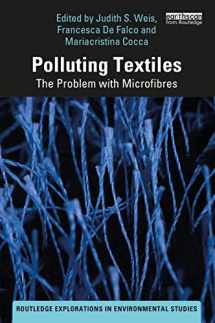
Polluting Textiles: The Problem with Microfibres (Routledge Explorations in Environmental Studies)
Book details
Summary
Description
This book examines the critical issue of environmental pollutants produced by the textiles industry.
Comprised of contributions from environmental scientists and materials and textiles scientists, this edited volume addresses the environmental impact of microplastics, with a particular focus on microfibres released by textiles into marine and freshwater environments. The chapters in Part I offer environmental perspectives focusing on the measurement of microplastics in the environment, their ingestion by small plankton and larger filter feeders, the effects of consuming microplastics, and the role of microplastics as a vector for transferring toxic contaminants in food webs. Written by environmental and material scientists, the chapters in Part II present potential solutions to the problem of microplastics released from textiles, discussing parameters of influence, water treatment, degradation in aquatic environments, textile end-of-life management, textile manufacturing and laundry, and possible policy measures. This is a much needed volume which brings together in one place environmental research with technical solutions in order to provide a cohesive and practical approach to mitigating and preventing environmental pollution from the textiles industry going forward.
This book will be of great interest to students and scholars of environmental conservation and management, environmental pollution and environmental chemistry and toxicology, sustainability, as well as students and scholars of material and textiles science, textile engineering and sustainable manufacturing.


We would LOVE it if you could help us and other readers by reviewing the book
Book review



